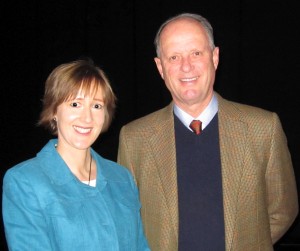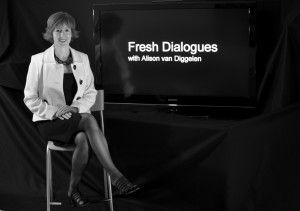By Alison van Diggelen, host of Fresh Dialogues
Transcript: Exclusive Fresh Dialogues interview with Robert Ballard, Ocean scientist of Titanic Fame, January 22, 2010
Watch the video and read the post here
Alison van Diggelen: Hello and welcome to Fresh Dialogues. Today I’m interviewing Robert Ballard, ocean explorer and discoverer of the Titanic. Thank you for joining us. Dr. Ballard, I want to thank you very much for being on Fresh Dialogues today.
Robert Ballard: Pleasure to be here.
Alison: A question came up last night about global warming and you had a two-prong answer…Can you explain what you meant by that… you’re not worried about the planet…
Robert: I’m not worried about the earth. There have been times in earth’s history, in the Cretaceous (period) for example, 90 million years ago, when it was a lot warmer than it is now. There were no glaciers, there wasn’t an ice-cube on the planet, sea-level was much higher. We’re just the latest bad thing, maybe, that’s happening to the earth. So, I’m not really worried about the earth’s survival.
Alison: What about mankind?
Robert: I worry about mankind. Sometimes I see this tombstone that says, “the human race came and went but it was politically correct.” As a scientist I am not politically correct. My job is not to be politically correct. My job is to call it as I see it.
And I see that the biggest problem the human race has is that there are too many of us. You can’t have uncontrolled population growth. And then to take that population growth and multiply it times our footprint. Everyone wants to be an American and that would be the worst thing in the world… if everyone emulated us, because we’re so consumptive. An important thing for Americans to do is to drop their footprint.
Alison: Are you talking specifically about their carbon footprint?
Robert: Exactly.
Alison: Are you saying there is a human element to global warming?
Robert: Absolutely. I mean, we’re in a natural cycle. The real argument is: how much of this is a natural cycle and how much is it human additive? Hey folks: it’s both. Whenever you have a tremendous controversy both sides tend to be right and wrong. You do have the natural interglacial warming that we’re experiencing, but you are increasing the severity of it with the human footprint. The concern most people have is that we can’t do much about the natural cycle, but we can do a lot about the human cycle. What people are worried about is if you steepen it too much, evolution can’t keep up and you get extinction. You don’t have adaptation to change…you have extinction and I think that’s what people are really worried about; they do see extinction.
 Alison: Do you agree with Al Gore that there’s an urgent impetus for us as Americans to do something?
Alison: Do you agree with Al Gore that there’s an urgent impetus for us as Americans to do something?
Robert: If you want to know the truth: it’s too late. Okay. All the ice is going to melt.
There’s a lag and it’s already in the system. In fact people don’t want to say that because they still want people to change their ways. But when it comes to glaciers and Polar Regions: it’s going to melt. Sea level is going to come up.
Alison: Are you saying we should do nothing?
Robert: No I’m not. I was taught, when it doubt, try the truth. It’s never too late to change your ways. I’m not so worried about warming, because that’s going to happen and it’s happening. I’m more worried about disease; I’m more worried about pandemics. I’m more worried about that than the sea level rising. At least we can walk inland. But I’m more worried about the spread of disease. That’s a bigger threat.
Alison: What are your views on alternative energy? The ocean is over 70% of the earth, what about harnessing the power of waves?
Robert: As an American, I’m more pro alternative energy because it so affects our relationships with other countries than it does economic impact. I don’t like being dependent upon oil that’s controlled by countries that don’t like us. So, I’m more concerned about that than I am moving away from fossil fuel to wind energy or solar energy. I’m more worried about how it affects our foreign policy. So I come down more on that concern than reducing our carbon footprint.
Alison: What about wave energy?
Robert: Wave energy is a lot harder. I’m actually very pro nuclear. I thought the Three Mile Island calamity was an absolute disaster. A disaster for our country, because I’m very pro nuclear energy. I think it’s safe if done wisely. I envy what France has done. I think they’re up to 90%. But because of that horrible tragedy and how it frightened people…and the media added to that fear. I was a little upset with that…of hyping it…which media has a wonderful capability of doing…that we lost a generation of bringing more and more nuclear power online.
Alison: Well Dr. Ballard, I really appreciate your taking the time.
Robert: Pleasure, pleasure.
This interview was recorded at the Flint Center in Cupertino, California. Dr. Ballard was in Silicon Valley as part of the Foothill College Celebrity Forum Series, hosted by Dr. Richard Henning. To see and read more interview segments with Dr. Ballard, on how he inspires education in science, gets funding for his expeditions and what his next adventure will be, check back soon.
For the young or young at heart, in answer to my Barbara Walters’s inspired question, if you were a sea creature, what sea creature would you be? Ballard answered: A killer whale.
For more exclusive interviews with Tom Friedman, Paul Krugman, Martin Sheen, Maureen Dowd and many others, check out Fresh Dialogues interview schedule



